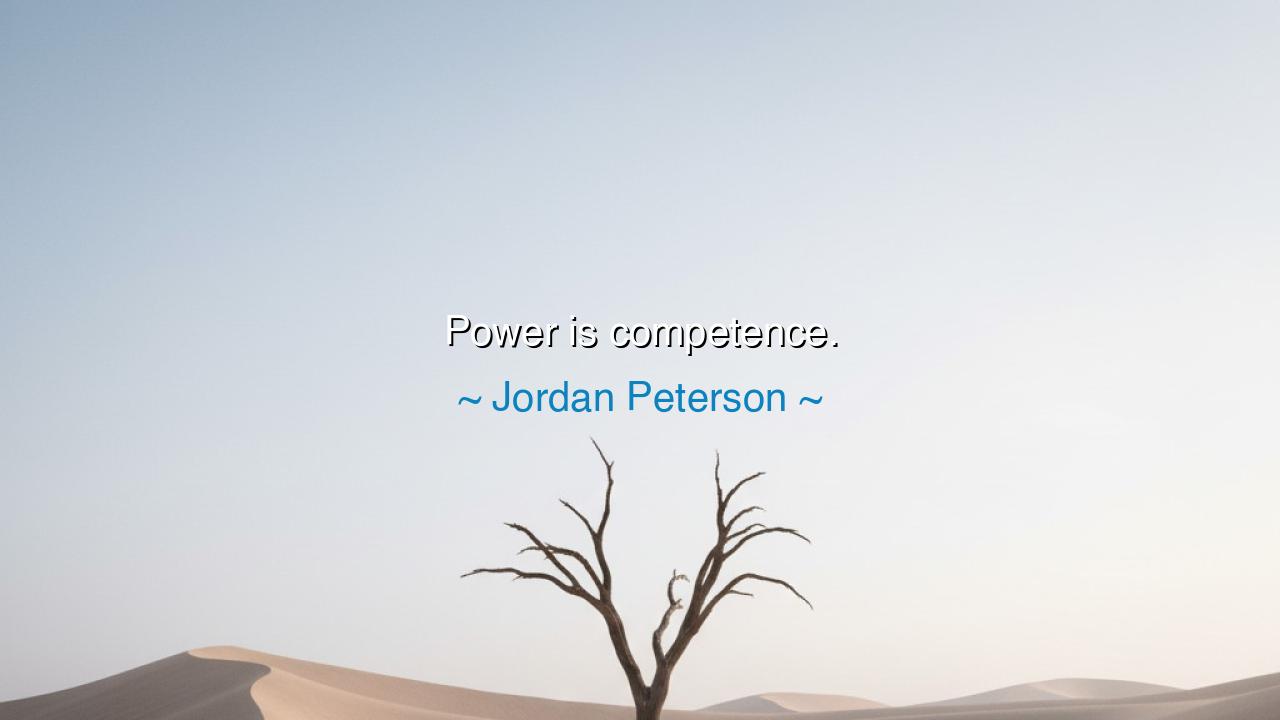
Power is competence.






Jordan Peterson, in his austere declaration, proclaims: “Power is competence.” These words tear away the veil of illusion, for many believe that power lies in wealth, in birth, or in the brute strength of command. But Peterson reminds us that true power belongs not to those who merely inherit or seize it, but to those who are competent, who know their craft, who master themselves and the world through skill, discipline, and understanding.
The meaning is profound: titles may be bestowed, riches may be granted, but without competence, they are fragile as glass. A king without wisdom is but a puppet; a general without strategy is but a butcher of men. Yet the humble artisan, the skilled healer, or the steadfast leader, though lacking crowns or treasures, wields a power that cannot be stolen. For competence is the foundation upon which lasting authority is built.
History shines with this truth. Consider Napoleon Bonaparte, who rose from obscurity to command nations. His competence in the art of war, his unmatched ability to maneuver armies and inspire men, gave him a power greater than his birth could ever grant. He was not of noble blood, yet the crowned heads of Europe trembled before him. His power did not come first—it was his competence that forged it, and power followed like iron drawn to a magnet.
This wisdom carries warning, too. Those who seek power without competence court disaster, for their rule collapses under the weight of their ignorance. History remembers many tyrants who grasped the throne through deceit or force, only to see their empires crumble because they lacked the knowledge to sustain them. Such power is but a shadow, soon scattered by the dawn of reality.
Therefore, let all who strive remember Peterson’s charge: to be powerful is not to dominate, but to become skilled, capable, and worthy. Mastery of one’s craft, mastery of one’s self—these are the true thrones from which influence flows. And when such competence is joined with integrity, it becomes a power that endures beyond lifetimes, a beacon for generations to come.






BCNguyen Ngoc Bao Chau
This phrase is simple yet provocative. It seems to suggest that real authority doesn’t come from title or status, but from the ability to get things done. I like that interpretation—it ties power to personal responsibility. Still, I wonder how this applies in modern systems where bureaucracy and politics often reward appearance over substance. Can true competence survive in environments that value image more than genuine skill and effectiveness?
HNHuynh Nhi
I find this idea appealing because it gives power an ethical foundation. It suggests that to be powerful is not to dominate others, but to be effective and capable. However, it also makes me wonder: what happens when competence is used for harmful purposes? History shows that even highly competent people can misuse their abilities. So perhaps competence grants power, but wisdom and morality determine how that power should be applied.
HNDinh Huy Nguyen
This quote makes me think about how power structures operate. It sounds logical that competence creates power, but I’m not sure it always works that way. Plenty of competent people never rise to influence, while others gain power through luck or manipulation. Maybe Peterson means that real, lasting power—the kind based on respect and results—comes only from competence. If that’s true, then maybe moral and practical skill are the ultimate equalizers.
TPTri Pham
I see truth in this, but it also raises questions. If power comes from competence, then wouldn’t the most capable people naturally lead? Yet, we often see charisma, wealth, or connections playing bigger roles. Perhaps Peterson is talking about a deeper kind of power—the quiet authority of those who know what they’re doing. Still, I wonder whether society truly rewards competence, or just the appearance of it in confident people.
3TTra 33_Pham Thanh
This statement is fascinating because it reframes power not as dominance or control, but as skill and mastery. It feels empowering to think that true influence comes from being capable rather than manipulative. But I wonder—does competence always translate into power in real life? So often, people in positions of authority aren’t necessarily the most skilled. Maybe Peterson is describing an ideal rather than a reality, where merit and ability truly rule.